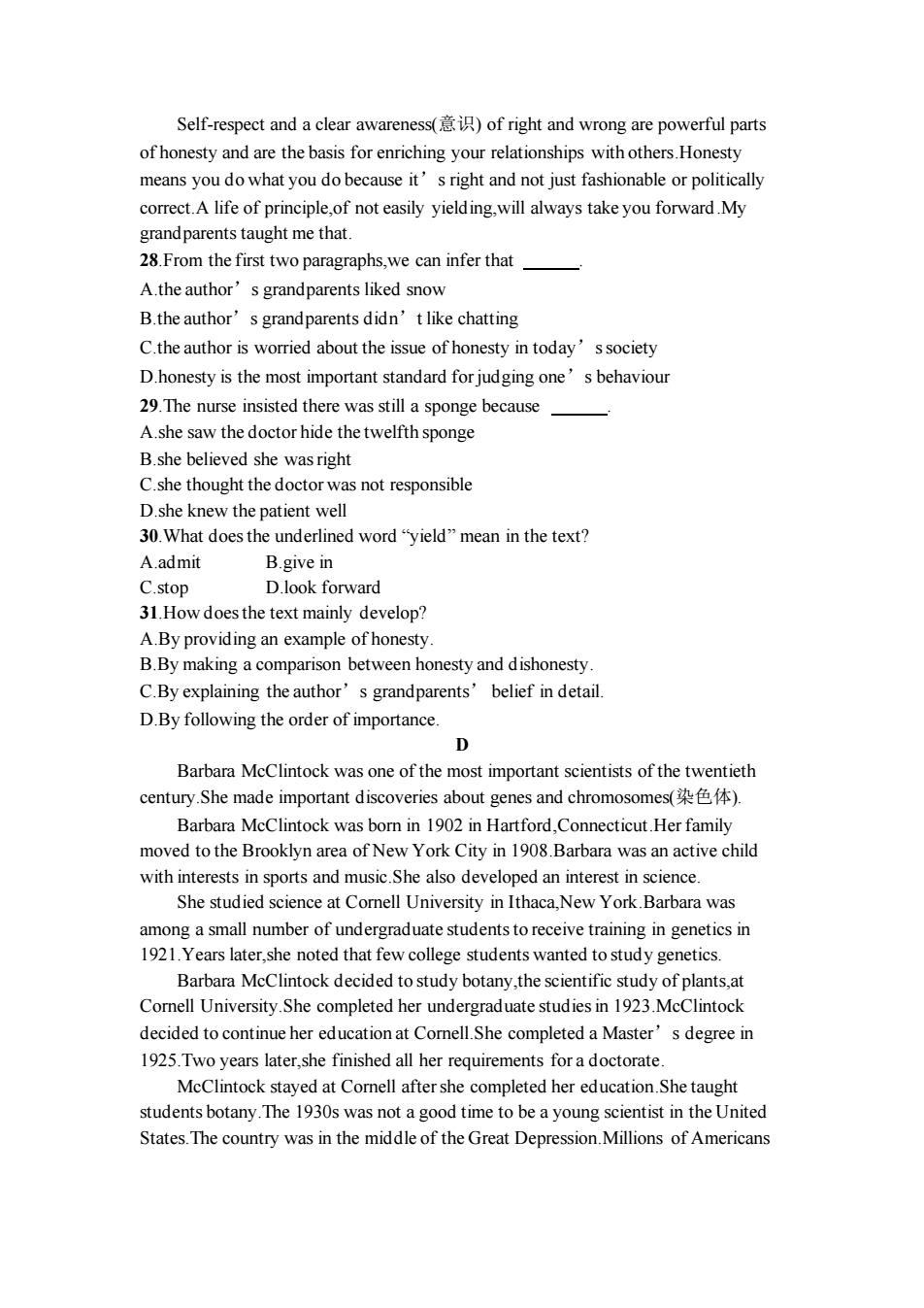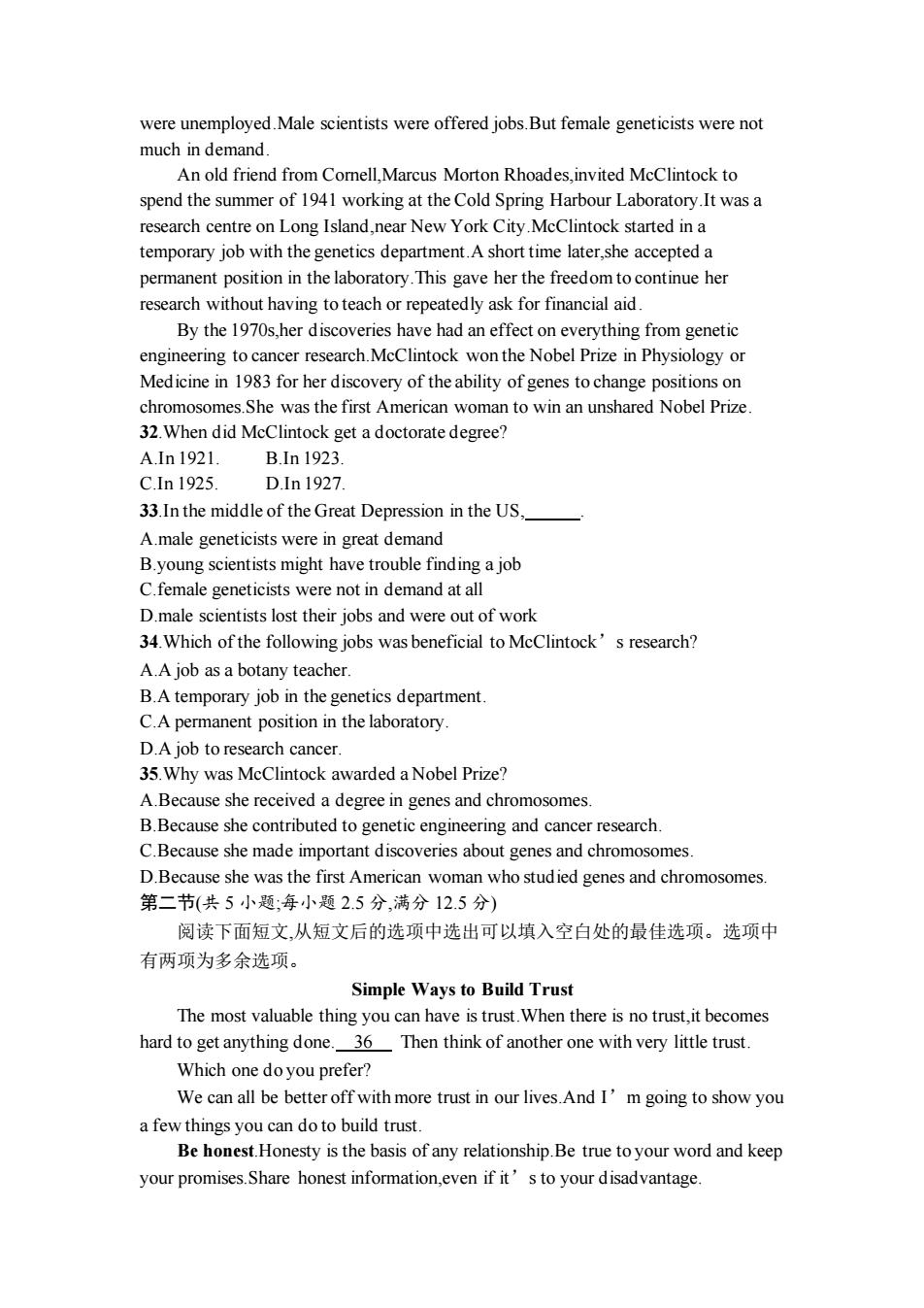
Self-respect and a clear awareness()of right and wrong are powerful parts of honesty and are the basis for enriching your relationships with others.Honesty means you do what you do because it's right and not just fashionable or politically correct.A life of principle,of not easily yielding,will always take you forward.My grand parents taught me that. 28.From the first two paragraphs,we can infer that A.the author's grandparents liked snow B.the author's grandparents didn't like chatting C.the author is worried about the issue of honesty in today's society D.honesty is the most important standard for judging one's behaviour 29.The nurse insisted there was still a sponge because A.she saw the doctor hide the twelfth sponge B.she believed she was right C.she thought the doctor was not responsible D.she knew the patient well 30.What does the underlined word"yield"mean in the text? A.admit B.give in C.stop D.look forward 31.How does the text mainly develop? A.By providing an example of honesty B.By making a comparison between honesty and dishonesty. C.By explaining the author's grandparents'belief in detail. D.By following the order of importance. D Barbara McClintock was one of the most important scientists of the twentieth century.She made important discoveries about genes and chromosomes(). Barbara McClintock was born in 1902 in Hartford,Connecticut.Her family moved to the Brooklyn area of New York City in 1908.Barbara was an active child with interests in sports and music.She also developed an interest in science. She studied science at Cornell University in Ithaca,New York.Barbara was among a small number of undergraduate students to receive training in genetics in 1921.Years later,she noted that few college students wanted to study genetics. Barbara MeClintock decided to study botany,the scientific study of plants,at Cornell University.She completed her undergraduate studies in 1923.McClintock decided to continue her education at Cornell.She completed a Master's degree in 1925.Two years later,she finished all her requirements for a doctorate. McClintock stayed at Cornell after she completed her education.She taught students botany.The 1930s was not a good time to be a young scientist in the United States.The country was in the middle of the Great Depression.Millions of Americans
Self-respect and a clear awareness(意识) of right and wrong are powerful parts of honesty and are the basis for enriching your relationships with others.Honesty means you do what you do because it’s right and not just fashionable or politically correct.A life of principle,of not easily yielding,will always take you forward.My grandparents taught me that. 28.From the first two paragraphs,we can infer that . A.the author’s grandparents liked snow B.the author’s grandparents didn’t like chatting C.the author is worried about the issue of honesty in today’s society D.honesty is the most important standard for judging one’s behaviour 29.The nurse insisted there was still a sponge because . A.she saw the doctor hide the twelfth sponge B.she believed she was right C.she thought the doctor was not responsible D.she knew the patient well 30.What does the underlined word “yield” mean in the text? A.admit B.give in C.stop D.look forward 31.How does the text mainly develop? A.By providing an example of honesty. B.By making a comparison between honesty and dishonesty. C.By explaining the author’s grandparents’ belief in detail. D.By following the order of importance. D Barbara McClintock was one of the most important scientists of the twentieth century.She made important discoveries about genes and chromosomes(染色体). Barbara McClintock was born in 1902 in Hartford,Connecticut.Her family moved to the Brooklyn area of New York City in 1908.Barbara was an active child with interests in sports and music.She also developed an interest in science. She studied science at Cornell University in Ithaca,New York.Barbara was among a small number of undergraduate students to receive training in genetics in 1921.Years later,she noted that few college students wanted to study genetics. Barbara McClintock decided to study botany,the scientific study of plants,at Cornell University.She completed her undergraduate studies in 1923.McClintock decided to continue her education at Cornell.She completed a Master’s degree in 1925.Two years later,she finished all her requirements for a doctorate. McClintock stayed at Cornell after she completed her education.She taught students botany.The 1930s was not a good time to be a young scientist in the United States.The country was in the middle of the Great Depression.Millions of Americans

were unemployed.Male scientists were offered jobs.But female geneticists were not much in demand. An old friend from Cornell,Marcus Morton Rhoades,invited MeClintock to spend the summer of 1941 working at the Cold Spring Harbour Laboratory.It was a research centre on Long Island,near New York City.McClintock started in a temporary job with the genetics department.A short time later,she accepted a permanent position in the laboratory.This gave her the freedom to continue her research without having to teach or repeatedly ask for financial aid. By the 1970s,her discoveries have had an effect on everything from genetic engineering to cancer research.McClintock won the Nobel Prize in Physiology or Medicine in 1983 for her discovery of the ability of genes to change positions on chromosomes.She was the first American woman to win an unshared Nobel Prize 32.When did McClintock get a doctorate degree? A.In1921.B.In1923. C.In1925. D.In 1927. 33.In the middle of the Great Depression in the US, A.male geneticists were in great demand B.young scientists might have trouble finding a job C.female geneticists were not in demand at all D.male scientists lost their jobs and were out of work 34.Which of the following jobs was beneficial to McClintock's research? A.A job as a botany teacher. B.A temporary job in the genetics department. C.A permanent position in the laboratory. D.A job to research cancer. 35.Why was McClintock awarded a Nobel Prize? A.Because she received a degree in genes and chromosomes. B.Because she contributed to genetic engineering and cancer research C.Because she made important discoveries about genes and chromosomes D.Because she was the first American woman who studied genes and chromosomes. 第二节(共5小题:每小题2.5分,满分12.5分) 阅读下面短文,从短文后的选项中选出可以填入空白处的最佳选项。选项中 有两项为多余选项。 Simple Ways to Build Trust The most valuable thing you can have is trust.When there is no trust,it becomes hard to get anything done.36 Then think of another one with very little trust. Which one do you prefer? We can all be better off with more trust in our lives.And I'm going to show you a few things you can do to build trust. Be honest.Honesty is the basis of any relationship.Be true to your word and keep your promises.Share honest information,even if it's to your disadvantage
were unemployed.Male scientists were offered jobs.But female geneticists were not much in demand. An old friend from Cornell,Marcus Morton Rhoades,invited McClintock to spend the summer of 1941 working at the Cold Spring Harbour Laboratory.It was a research centre on Long Island,near New York City.McClintock started in a temporary job with the genetics department.A short time later,she accepted a permanent position in the laboratory.This gave her the freedom to continue her research without having to teach or repeatedly ask for financial aid. By the 1970s,her discoveries have had an effect on everything from genetic engineering to cancer research.McClintock won the Nobel Prize in Physiology or Medicine in 1983 for her discovery of the ability of genes to change positions on chromosomes.She was the first American woman to win an unshared Nobel Prize. 32.When did McClintock get a doctorate degree? A.In 1921. B.In 1923. C.In 1925. D.In 1927. 33.In the middle of the Great Depression in the US, . A.male geneticists were in great demand B.young scientists might have trouble finding a job C.female geneticists were not in demand at all D.male scientists lost their jobs and were out of work 34.Which of the following jobs was beneficial to McClintock’s research? A.A job as a botany teacher. B.A temporary job in the genetics department. C.A permanent position in the laboratory. D.A job to research cancer. 35.Why was McClintock awarded a Nobel Prize? A.Because she received a degree in genes and chromosomes. B.Because she contributed to genetic engineering and cancer research. C.Because she made important discoveries about genes and chromosomes. D.Because she was the first American woman who studied genes and chromosomes. 第二节(共 5 小题;每小题 2.5 分,满分 12.5 分) 阅读下面短文,从短文后的选项中选出可以填入空白处的最佳选项。选项中 有两项为多余选项。 Simple Ways to Build Trust The most valuable thing you can have is trust.When there is no trust,it becomes hard to get anything done. 36 Then think of another one with very little trust. Which one do you prefer? We can all be better off with more trust in our lives.And I’m going to show you a few things you can do to build trust. Be honest.Honesty is the basis of any relationship.Be true to your word and keep your promises.Share honest information,even if it’s to your disadvantage